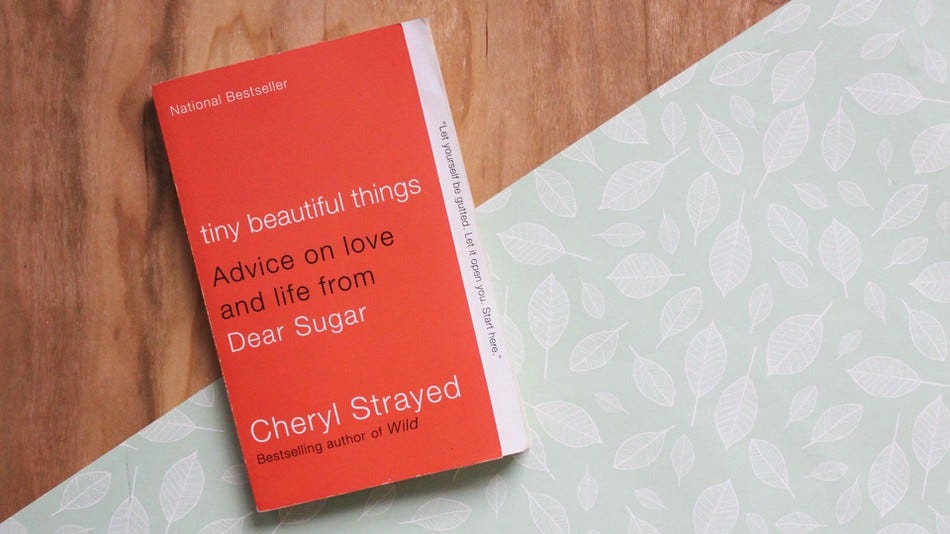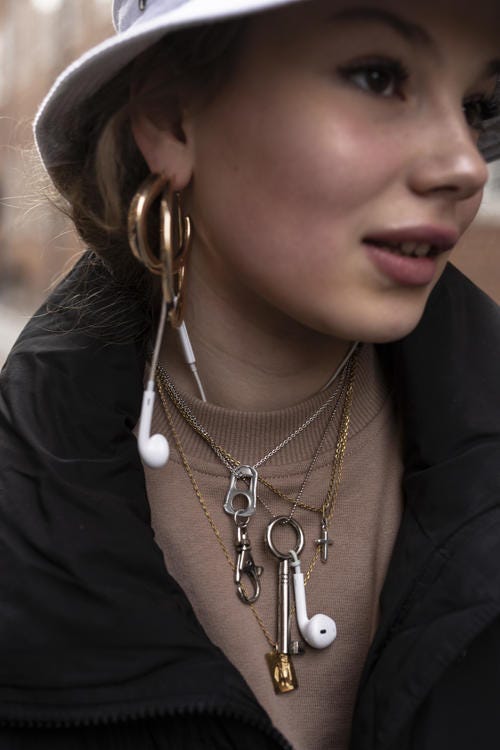🌈 💋 vol.25 / being authentic, and the fear of selling out /
Most of us confuse mediocrity with inauthenticity.

“Everybody is identical in their secret unspoken belief that way deep down they are different from everyone else.”
― David Foster Wallace, Infinite Jest

Hello beautiful people —
I’ve been having some heart to heart conversations with creators that I met on the Internet. Instagram, specifically (both Instagram and Twitter are more powerful networking tools than Linkedin to find exciting and creative people).
I asked them: what’s the moment that made you feel like you’ve matured as a creative person?
One uncanny commonality of their responses is the ability to separate oneself from one’s work. This goes far beyond not taking feedbacks and critiques personally, but the separation also entails the construction of an identity that caters to a selected group of audience.
I’ve found myself unable to create when I start to overly obsessed with a false sense of authenticity (is this really ME?). The obsession only backfires, since the creative process is simply not about me. I wrote drafts after drafts of subconscious throw-ups that may simply make zero sense to people. It did feel somewhat cathartic, but the truth is I’m not providing value, not getting feedback (as it’s confusing to people so they wouldn’t even know how to give feedback), and thus I’m not getting better.
Many bright, creative people who are just starting off their careers, including myself, worry about selling out or inauthenticity, but most of us tend to confuse mediocrity with inauthenticity.
When we feel like our work doesn’t have the impact that we’d like, we are immobilized, unmotivated, and even disillusioned by the real fear that what we do could be harmful or meaningless, but most of us haven’t yet gotten that good to really know if that fear is valid.
I’ve come to learn that authenticity simply means staying true to your values. Authenticity doesn’t mean we have to fixate on our practice or even the actual work itself. If you are an old school film photographer, learning how to take beautiful lifestyle images for Airbnb is not selling out.
Being authentic also doesn’t mean that what you have in your head right now is any good. You may be seeing a forest, but what to see are skyscrapers. Instead of resenting that people don’t get you, ask what do you love so much about the woods that can be incorporated and represented through the skyline?
Being authentic means, you serve the people you want to help and delight the souls who need it the most.
We should be malleable, and we learn to adapt to what serves our audience the best. What surprises them, delight them, challenges them, and inspires them. The prevailing sentiment “should this product exist?” or “should designers be designing for ads?” are quite productive. A better question is, “how can ads exist, so it betters the experience of why the user came on the platform in the first place?” No creation is inherently good or bad on its own, it’s about its relations with everything else in the ecosystem.
Another thing that we talked about is that many people who label themselves as creative are not actually that original, they simply got the drip that the best creators own. When we see through the layers, there are so many hidden gems, and it feels great when you get to excavate them. A dude in a Patagonia vest may look the furthest thing from a creative and authentic person, but that’s just my naivete. They are brilliant. They just need a personal stylist.
Stay real,
Tina


Speaking of creating content for an audience, I came across the startup Serial Box, a startup bringing back the tradition of serialized fiction, just raised $4.5 million in seed funding. A proud book nerd as I’m, it caught my attention immediately
They see the big opportunity to retool reading for the smartphone age, to take “the best elements of traditional book publishing and innovate with influences from the audio, podcast, gaming and TV industries.” (Source: Crunchbase)
The first episode of each story is free — then if you’re hooked, you can pay $1.99 for additional episodes or sign up for a season pass. Another “no BS, quality wins” business model that I like. The key here is bite-sized consumption and delayed gratification.
There are a few things that I wish I could see:
Since it’s 2019, and there are just so many ways of storytelling. I’m eager to see how the “Choose-Your-Own-Adventure” model would play out here. What if I get different next chapter based on the decision I made in the first chapter? This is not impossible if AI can assist the process of mass plot creation.
On the publisher side, if they can make publishing fiction. In this Twitter thread, many talented engineers/designers dreams are to write a fiction book of their own. What if that can become a reality with the assistance of data-informed education?
Who doesn’t want to be the author of their own epic?


IMAGE: MJ FRANKLIN/ MASHABLE
I read Tiny Beautiful Things by Cheryl Strayed, a collection of letters Strayed wrote to her reading inquiring her a wide variety of life topics. Her primary message? Get over yourself. Ask better questions. The fuck is your life. Answer it.
I have to confess I baweled to Sugar talking to a 26-year-old novelist with writer's block who is crippled with fear envy: "We get the work done on the ground level. And the kindest thing I can do for you is to tell you to get your ass on the floor."
I bawled when Strayed looked at me with compassion telling me she’s been there, and her advice really applies to any endeavor to make anything great. No tears (or time) left to cry. Get your ass to work.
The passage is so great that I have to share
“Do you know what that is, sweat pea? To be humble? The word comes from the Latin words humilis and humus. To be down low. To be of the earth. To be on the ground. That’s where I went when I wrote the last word of my first book. Straight onto the cool tile floor to weep. I sobbed and I wailed and I laughed through my tears. I didn’t get up for half an hour. I was too happy and grateful to stand. I had turned thirty-five a few weeks before. I was two months pregnant with my first child. I didn’t know if people would think my book was good or bad or horrible or beautiful and I didn’t care. I only knew I no longer had two hearts beating in my chest. I’d pulled one out with my own bare hands. I’d suffered. I’d given it everything I had.
I’d finally been able to give it because I’d let go of all the grandiose ideas I’d once had about myself and my writing—so talented! so young! I’d stopped being grandiose. I’d lowered myself to the notion that the absolute only thing that mattered was getting that extra beating heart out of my chest. Which meant I had to write my book. My very possibly mediocre book. My very possibly never-going-to-be-published book. My absolutely nowhere-in-league-with-the-writers-I’d-admired-so-much-that-I-practically-memorized-their-sentences book. It was only then, when I humbly surrendered, that I was able to do the work I needed to do.
I hope you’ll think hard about that, honey bun. If you had a two-sided chalkboard in your living room I’d write humility on one side and surrender on the other for you. That’s what I think you need to find and do to get yourself out of the funk you’re in. The most fascinating thing to me about your letter is that buried beneath all the anxiety and sorrow and fear and self-loathing, there’s arrogance at its core. It presumes you should be successful at twenty-six, when really it takes most writers so much longer to get there. It laments that you’ll never be as good as David Foster Wallace—a genius, a master of the craft—while at the same time describing how little you write. You loathe yourself, and yet you’re consumed by the grandiose ideas you have about your own importance. You’re up too high and down too low. Neither is the place where we get any work done.”

Freshest fashion/lifestyle/design bites.


#THEMUNDANE
#THEMUNDANE is the repurpose and reuse of everyday elements to inspire rmieagination. The brand identity of my newsletter is heavily inspired by the minimal sans-serif type and riff off mass-market branding as well as recycle basic branded packaging like rice sacks, making use of undervalued resources and championing zero waste
The overarching purpose of reaching for the mundane is to prime our minds to be receptive of inspirations and resources that come from all corners of our daily interactions, making use of the undervalued and bringing beauty to the underrepresented.

This newsletter has serendipitously become a community that discovers and connects impact-driven makers.
Reply if you want to be a part of this.
I’m also looking for individuals who are passionate about defining what the future of this community could look like. Let me know if you have any ideas.
That’s it. I love you. 💙
🍭 Share with the world if you enjoyed this
👻 Don't be shy. Reply to this email & be friends.

Twitter / Website / Medium / Instagram




